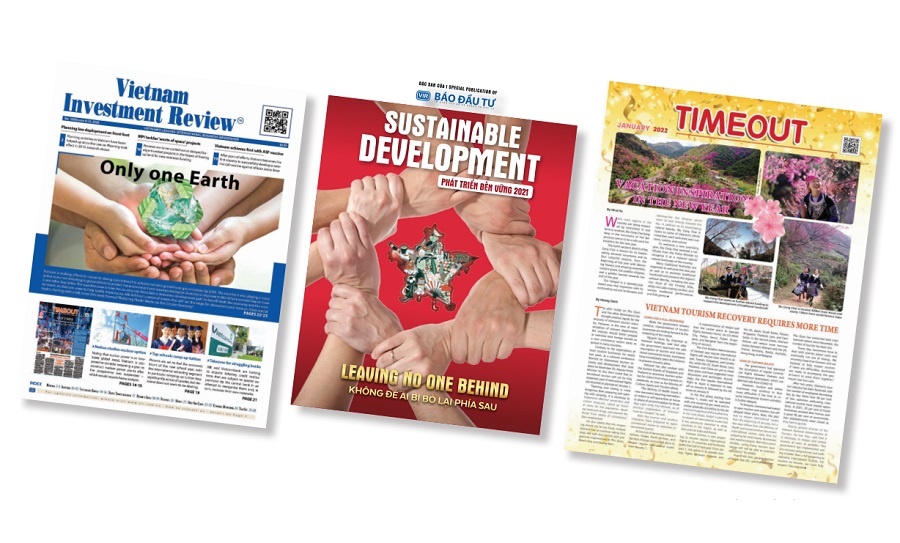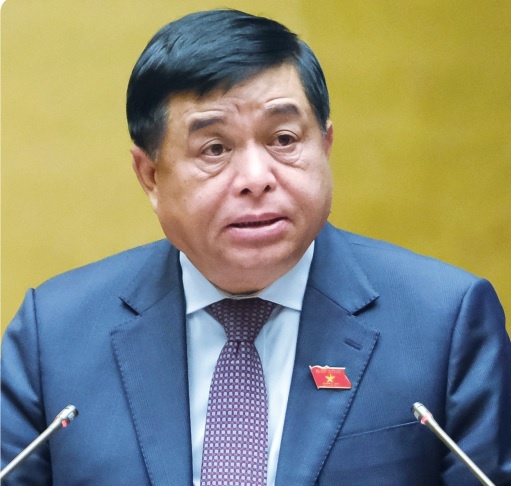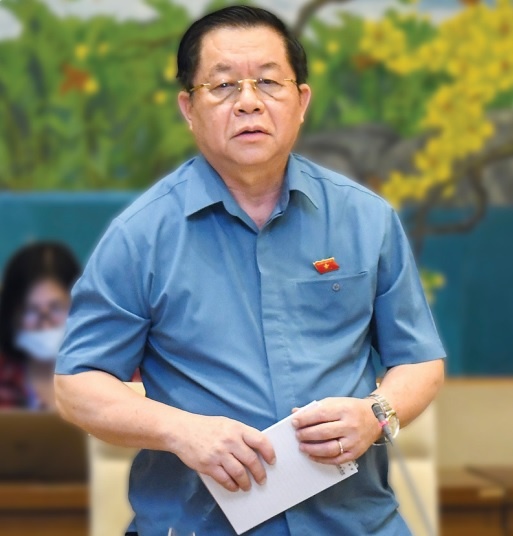Role of press highlighted in promoting development
 |
| Role of press highlighted in promoting development |
Nguyen Thu Lan, a consultant from a Hanoi-based US-invested investment consultancy firm, two weeks ago completed a digital transformation report for the firm’s three potential American clients, who are exploring Vietnam’s investment climate.
Lan had to seek information from many sources for the report, including local newspapers. She also found detailed information on Vietnam’s macroeconomic situation and digital transformation in VIR, which features a new hallmark scheme from the government on supporting industrial enterprises in smart production development.
Lan said, “I am very happy as I had been seeking such information for months. More importantly, such information was cited from an original source,” she said.
Under the draft scheme, expected to be enacted by the government soon, just over one-third of Vietnamese businesses will implement digital transformation effectively by 2025, and the rate will increase to 85 per cent by the end of the decade. In addition, the government wants to support all firms in raising awareness and improving skills in digital transformation by 2025.
To achieve these goals, the draft scheme has highlighted many solutions, including the application of a sandbox, and the formulation and enactment of sets of criteria for determining levels of digital transformation among enterprises, which will make it favourable for the state to offer incentives to them.
“All foreign investors are to be offered the best conditions and policies for cooperating with domestic enterprises in deploying new investment and business models in service of activities in digital transformation and smart production development,” read the draft. Related ministries will provide details of the incentives and preferential policies noted in the draft for enterprises.
Consultant Lan said the domestic economic press has greatly contributed to her firm’s successful performance since 2004 when the firm was established in Vietnam. Unlike in the past, Vietnam’s economic newspapers now generally feature specific information about the role of the private economic sector in the economy, the government’s policies on curbing inflation, stabilising the macroeconomy, and ensuring social security and reducing poverty.
“Such information is greatly helpful for foreign investors and enterprises,” she said.
Meanwhile, Matti Tervo, a counsellor at the Embassy of Finland to Vietnam, told VIR that for diplomatic agencies like his, the media plays a significant role.
“VIR was likely the very first English-language newspaper in Vietnam to publish news about Finland,” Tervo said. “Many Finns who have been working in Vietnam over the decades recall the time when Vietnam opened up to world integration and VIR’s role in delivering the news. What the Ministry of Foreign Affairs archives do tell us are the many stories of VIR visits and articles relating to Finland.”
| Nguyen Chi Dung, Minister of Planning and Investment
We highly appreciate the increasing role of the press in the process of socioeconomic development. Reporters are getting better at detecting and revealing issues, as well as promoting and encouraging good practices, which are the foundation for the government, ministries, agencies, and localities to contribute to amending laws and regulations to fit with reality. Besides that, the press plays an important role in propagating, orienting public opinions, contributing to conveying messages and policies of Party and state, and boosting awareness of the implementation of new policies. For the Ministry of Planning and Investment (MPI), our tasks do not relate much to people’s everyday lives, in terms of hot issues such as the price of gasoline, food, and logistics, which are increasing production costs. There is a delay between the policy outcomes of the MPI and the impacts on people because of the long-term focus. The MPI is a government agency which performs the function of state management over planning, development investment, and statistics, including the provision of general advice on strategies and master plans for national socioeconomic development and public investment. It also takes care of mechanisms and policies for economic management; domestic and foreign investment; economic zones; and official development assistance sources. In addition, the ministry covers bidding, statistics, preferential loans and foreign non-governmental aid, enterprise development, the collective economy, and state management across public services in sectors and fields under its management as prescribed by law. The MPI has received a lot of support from the press over the past years, contributing to the success and socioeconomic development achievements of the ministry and the country as a whole. In the time to come, there will be a lot of risks and global changes, and new prospects will also be revealed. Therefore, Vietnam will have to change policies and ways of thinking to adapt and seize various opportunities. Besides that, there are a lot of tasks that the MPI has to accomplish this year, such as the master plans of sectors and areas, implementation of an economic recovery plan, boosting public investment disbursement, and luring more foreign investment. They all need the contribution and support of the press. Nguyen Trong Nghia, Chairman of the Party Central Committee’s Commission for Communication and Education
Under the proper leadership of the Party, which is often directly the Politburo, the Secretariat and directly Party General Secretary Nguyen Phu Trong, and under the government’s drastic and synchronous and flexible direction and management; and with the operation of the whole political system, especially the spirit of solidarity, kindness, joint efforts, and wholeheartedness of our whole nation, our people have gradually pushed back the pandemic, and effectively implemented a new motto, which is to adapt safely and effectively control COVID-19, and accelerate the recovery and development of the economy, culture, and society. Those successes, first of all, stem from the aggregated strength and aspiration of our whole nation, including the companionship of the propaganda work in general and the press work of the country. Our team of journalists and press agencies have been very proactive, effective, and flexible in timely, truthfully, and objectively reflecting the activities of our people and of the whole political system. This makes a very important contribution to shaping public opinion, creating consensus in society, strengthening our people’s confidence in the leadership of the Party and state, and also providing international friends with a better understanding of all that our people have achieved. Over the past 97 years, the Vietnamese revolutionary press has been closely associated with the revolutionary cause of the Party and of people in different historical periods of the country. Since the establishment of the Party in 1930, the press has always been a driving force on the ideological and cultural fronts, making great contributions to the revolutionary cause. The 13th National Party Congress set out the task of building a professional, humane, and modern revolutionary press circle. At the same time, the congress reaffirmed that it is necessary to strengthen the management and orientation of the activities of the press management agencies, and focus on training and building a contingent of press managers, reporters, editors, and contributors who have a firm political stance, fine moral qualities, and professional expertise to improve the effectiveness of propaganda activities. In the past year, through the resolutions of the Central Party Committee and the articles and guiding speeches by Party General Secretary Nguyen Phu Trong at national conferences, our Party, which is directly the general secretary, has paid special attention to communication and press work. The Central Party Committee has further determined that it is necessary to continue to perform synchronous development planning, press management, and publication. It is also necessary to strengthen orientation, uphold mission and responsibility, improve the quality of activities of the press, and strictly manage websites, especially social networks, while strengthening information orientation and strictly handling organisations and individuals that take advantage of the internet to distort the truth and incite internal turmoil and division. Journalists are revolutionary soldiers, while pens and paper are their sharp weapons. We must strive to be worthy of the noble mission entrusted by the Party, the state, and the people – with the trust of the people. At this time, more than ever, journalists need to improve their professional skills, political stance, and professionalism. They must be loyal to the Party and the country’s revolutionary stance. They also need to have a major spirit of international integration while enhancing ethical values and strictly implementing articles on the professional ethics of Vietnamese journalists and abiding by regulations on using social networks in the current digital transformation trend. I would like to wish all journalists across the country to be always full of enthusiasm and professional and creative aspirations, promote the good traditions of Vietnam’s revolutionary journalism, continue to innovate even more strongly, master modern journalism technology, and enhance the human and noble mission of the national press in the new period, making a worthy contribution to the cause of national construction and protection. (Excerpt from speech at the National Press Festival, April 2022) |
A helping hand
According to the Ministry of Information and Communications, currently, Vietnam has over 850 press agencies employing about 50,000 people, including 20,000 reporters. This economic press system has featured an overview of Vietnam’s socioeconomic development situation.
Dozens of English-language newspapers have played a key role in conveying the Party and the government’s policies and laws, and helping foreign businesses and readers have the best information about Vietnam’s economy, so then they can craft proper investment policies.
At his meeting with leaders of press agencies last week in Hanoi, Prime Minister Pham Minh Chinh underlined that Vietnam’s revolutionary press had always “well-performed its task as a key communication tool to convey the Party and state’s policies and law” and contributed to national socioeconomic development.
“The press has actively carried information about Vietnam’s economic growth model renewal, economic restructuring, anti-pandemic policy, and anti-corruption,” PM Chinh said.
“In recent times, Vietnam has been striving to become one of the bright spots in the world in terms of fighting COVID-19 and boosting economic development. This success cannot be made without the contributions of the press, which has been making great efforts to convey the country’s policies,” PM Chinh added.
Dang Huu Cu, communications specialist at the Asian Development Bank in Vietnam, told VIR that the press has been providing timely information for policymakers to devise effective solutions for socioeconomic development.
“Their stories have helped us update new policies from the government and equip ourselves with new inputs for our multi-sectoral studies, especially important reports and publications relating to Vietnam,” Cu said.
“Press agencies including VIR have also frequently published interviews and stories by our experts on proposals, opportunities, and challenges for Vietnam to improve its development. This has provided readers with better and more objective understanding, so then they can make positive ideas for policy renewal and construction, creating consensus among the public on new policies,” Cu added.
Foreign firms in Vietnam can also access more information on people’s lives here, which helps on some level for their investment decisions in this country, according to Lan. “For example, one paper may feature stories about salaries but another may explain how the environment is being polluted and how Vietnam’s labour market is developing. Such information is quite valuable to foreign firms,” she said. “Also, the information is helpful to local authorities in their policy making process.”
Meanwhile, the European Chamber of Commerce in Vietnam (EuroCham) has annually released its Whitebook, a special publication hundreds of pages thick featuring the chamber’s policy proposals to the Vietnamese government, ministries, and central agencies. The book aims to help Vietnam ameliorate its business and investment climate, and protect the benefits of investors and businesses.
One of the notable things is that in order to make such proposals, EuroCham has sourced different information not only from its hundreds of member companies, but also from sources such as reports from ministries, agencies, and localities. However, one of the most important sources is the media including VIR.
Need further improvements
Nguyen Hong Ngan, senior external relations officer at the World Bank in Vietnam, told VIR that the media is crucial for Vietnam, and for international organisations’ performance as well.
However, some improvements could help local newspapers, especially economic newspapers, to enhance their quality.
“Vietnam is entering a new phase of development this year. The public demands higher quality publications, from content to cover, and better delivery of information,” Ngan said. “There are a lot of opportunities for newspapers to continue to explore and grasp, so as to gain a strong foothold in the new generation of readers. Catering to the information needs of the new and growing middle class, for example, will be challenging but also rewarding.”
Also, consultant Lan said she could not find some in-depth information in local newspapers because their information remained superficial. “For example, while enumerating figures about public investment, journalists need to make comparisons and tell readers how the figures can affect livelihoods, enterprises’ performance or even government monitoring policies,” she said.
According to Adam Sitkoff, executive director of the American Chamber of Commerce in Hanoi, there are concerns with the quality of some information transmitted by the media to the public.
“This is often unfair, a violation of confidentiality, and out of step with international norms. Another concern is that the information presented in the media is not always accurate and corrections are not often issued,” Sitkoff said. “As a society, we need to develop our critical thinking skills, be able to analyse the quality of the evidence, and also judge the reliability of the sources.”
What the stars mean:
★ Poor ★ ★ Promising ★★★ Good ★★★★ Very good ★★★★★ Exceptional
Related Contents
Latest News
More News
- State corporations poised to drive 2026 growth (February 03, 2026 | 13:58)
- Why high-tech talent will define Vietnam’s growth (February 02, 2026 | 10:47)
- FMCG resilience amid varying storms (February 02, 2026 | 10:00)
- Customs reforms strengthen business confidence, support trade growth (February 01, 2026 | 08:20)
- Vietnam and US to launch sixth trade negotiation round (January 30, 2026 | 15:19)
- Digital publishing emerges as key growth driver in Vietnam (January 30, 2026 | 10:59)
- EVN signs key contract for Tri An hydropower expansion (January 30, 2026 | 10:57)
- Vietnam to lead trade growth in ASEAN (January 29, 2026 | 15:08)
- Carlsberg Vietnam delivers Lunar New Year support in central region (January 28, 2026 | 17:19)
- TikTok penalised $35,000 in Vietnam for consumer protection violations (January 28, 2026 | 17:15)



 Tag:
Tag:




















 Mobile Version
Mobile Version